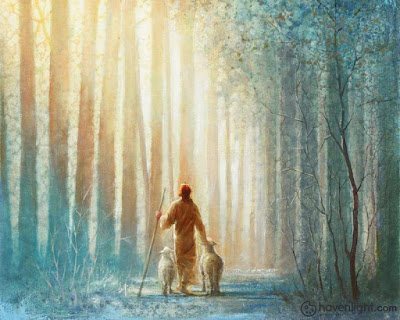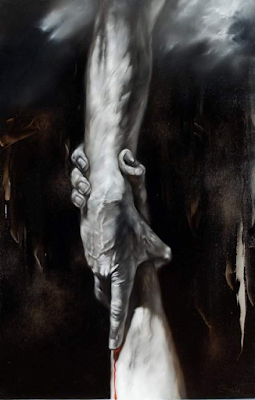For years now I have been gathering Saviour's titles as I study the scriptures. So far I have collected 59 but I am certain there are more. I cannot rightly decide which one I love most but The Hope of Israel comes very close to being number 1. In his last conference talk, Elder Gong of the Twelve, pointed out that of all His divine titles, there is no more tender or telling than The Good Shepherd. Some of us city folk of the 21st century might find it difficult to relate to this title because the pastoral life that the Saviour lived in is not within our frame of reference. What we know of the Saviour's role as The Good Shepherd comes to us through the scriptures. The Saviour often referred to Himself as such because the people of His day understood what a shepherd stood for.
In April 1988, Elder John R. Lasater gave a wonderful description of a true shepherd:
"Some years ago, it was my privilege to visit the country of Morocco as part of an official United States Government delegation. As part of that visit, we were invited to travel some distance into the desert to visit some ruins. Five large black limousines moved across the beautiful Moroccan countryside at considerable speed. I was riding in the third limousine, which had lagged some distance behind the second. As we topped the brow of a hill, we noticed that the limousine in front of us had pulled off to the side of the road. As we drew nearer, I sensed that an accident had occurred and suggested to my driver that we stop. The scene before us remained with me for these many years. An old shepherd, in the long, flowing robes of the Saviour's day, was standing near the limousine in conversation with the driver. Nearby, I noted a small flock of sheep numbering not more than fifteen or twenty. An accident had occurred. The king's vehicle had struck and injured one of the sheep belonging to the old shepherd. The driver of the vehicle was explaining to him the law of the land. Because the king's vehicle had injured one of the sheep belonging to the old shepherd, he was now entitled to one hundred times its value at maturity. However, under the same law, the injured sheep must be slain and the meat divided among the people. My interpreter hastily added, "But the old shepherd will not accept the money. They never do." Startled I asked him why. And he added, "Because of the love he has for each of his sheep." It was then that I noticed the old shepherd reach down, lift the injured lamb in his arms, and place it in a large pouch on the front of his robe. He kept stroking its head, repeating the same word over and over again. When I asked the meaning of the word, I was infomred, "Oh, he is calling it by name. All of his sheep have a name, for he is their shepherd, and the good shepherds know each one of their sheep by name." It was as my driver predicted. The money was refused, and the old shepherd with his small flock of sheep, with the injured one tucked safely in the pouch of his robe, disappeared into the beautiful deserts of Morocco." (John R. Lasater, "Shepherds of Israel", Ensign, May 1988, p 74)

In the Saviour's discourse on The Good Shepherd He stated that a good shepherd was someone who loved his sheep, knew each of them by name and would do anything to protect them, even give his life for them (John 10:1-14). He would go to any lengths to recover them when they get lost. Who could not be touched by the Saviour's parable of a shepherd leaving the 99 in his care to find the one sheep that was lost (Matthew 18:11-14)? Which of the 99 would not feel safe in His care knowing that if THEY were lost He would also come looking for THEM? Such is the heart of a shepherd. It is a heart of love. When Jesus asked Simon Peter if he loved Him and Peter answered 'yes', Jesus' only reply was: "Feed my sheep" (John 21:15,16).
The closest I came to understanding the role of a shepherd was during my childhood in Croatia. Even though my family lived in the city, my school holidays always found me in our home village with my grandparents and other relatives where I came to understand the saying 'until the cows come home'. Each morning 'a shepherd' would come through the streets of the village sounding his horn and the villagers would open their gates and usher out their cows which would follow the shepherd who would lead them to pasture. At the closing of the day, the gates would be re-opened and the cows would each wander into their homes. It always amazed me that they knew where they lived. What amazed me more is that they would follow a man who was not their owner. Obviously, the cows knew one thing - this man was going to feed them. So how do we as under-shepherds feed the injured sheep? What is the pasture we should lead them to? There is only one - the Saviour of the world. Had He not proclaimed himself to be the bread of life (John 6:33) and the fountain of living waters (Jeremiah 17:13, Rev 7:17)? He is the pasture, for do we not partake of his body and drink of his blood each Sunday at the sacramental table; the body that He has laid down in death that we might have life.

Have you ever felt lost? Dejected, misunderstood, diminished, uncertain or afraid? Following my divorce I was hanging by a thread. For some reason neither my Bishop or my Relief Society President nor any member of my Ward reached out to me. I had one close friend who loved me into survival. I do not know why nobody in my Ward reached out to me. It is not my intention to criticise or judge anyone here. Maybe I was meant to experience the initial trial of my faith alone or maybe people just didn't know what to say or do. I languished like this for months until I moved to another Ward and everything changed. I came under the care of a very loving Relief Society President who became my life long friend and a caring Bishop who kept close tabs on me. These two people were not just leaders, they were shepherds. Under their watchful eye I regained my trust in God and became stronger in the Church than I had ever been before. They not only carried me in the pocket of their robes but led me to pasture. Such is the fruit of a tireless shepherd. As expressed beautifully by a close friend of mine:
"Would the sheep have remained forever lost
Had the shepherd not searched for the sheep and carried it home?
Would the shepherd have stopped in his tracks and turned his back
On the one wandering aimlessly alone?
Or would he have continued to search
Through dark and mist, tiring with each step
Labouring onwards, heavy with grief
Until he found the wandering sheep and lifted it onto HIs shoulders
To carry it home???"
- Desley Innis
(condensed and revised)
He is our exampler. He is our Shepherd. He is the pasture. He is the staff of life. He is the sustanance of both body and mind. In Him is life, in Him is endurance, in Him is hope. As the Lamb of God has He not laid down His life in death that we might have life? In reference to His beloved sheep He has said: "I am come that they might have life, and that they might have it more abundantly. I am the good shepherd: the good shepherd giveth his life for the sheep." (John 10:10-11)





















